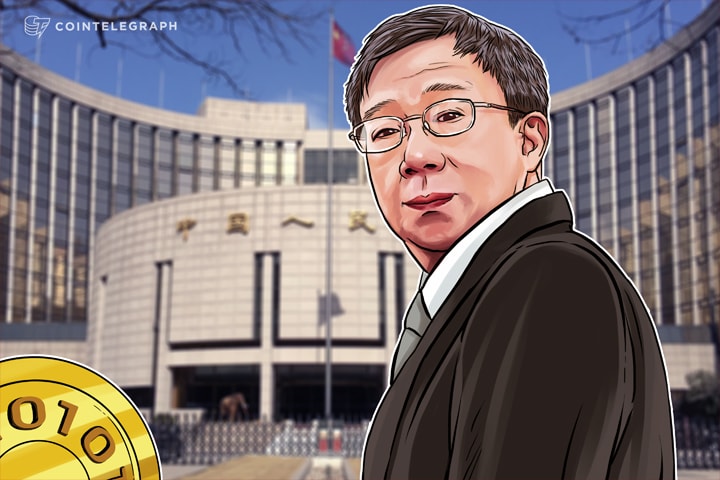Yi Gang, an American-trained economist, has been elected by the Chinese government to take over the People’s Bank of China (PBoC), the country’s central bank, as its head. The election of a pro-market economist could have a positive impact on the cryptocurrency market.
Pro-market, favors freedom
Both Chinese President Xi Jinping and PBoC’s new leader Yi Gang are pro-market and pro-market reform. Prior to his election, Yi has consistently emphasized the importance of market liberalization, and has invited economists along with experienced financial experts who could support his long-term plan to increase the flexibility of the Chinese market.
Already, within weeks since the election of Yi, the Chinese government has, for the first time, allowed foreign companies to enter the country’s payment sector and compete against local giants like e-commerce conglomerate Alibaba’s AliPay and the country’s largest technology corporation Tencent’s Tencent Pay.
For context - Tencent’s gaming successes
For context, China’s Tencent, which has made a series of successful acquisitions over the past few years including Riot Games, the game development company behind one of the most popular online games – League of Legends (LOL), surpassed the market valuation of Facebook in November 2017. Tencent became the first Asian company to break the $500 bln mark, and outdistanced Facebook prior to its Cambridge Analytica Scandal, which led Facebook to decline by nearly $70 bln drop from $517 bln to $445 bln.
In 2016, it was revealed that more viewers watched LOL, the game developed by Riot Games under Tencent, than the NBA finals. LOL’s professional esports league finals were hosted in the Beijing National Stadium, also known as Bird’s Nest, which has a capacity of 91,000 people. The NBA finals were watched by 31 mln people worldwide, while the LOL finals were watched by 36 mln people internationally.
The success of Tencent and its dominance over the global esports industry as well as social media, messaging, and payment markets is important to acknowledge because for the first time in its history, the Chinese government has given the company competition in the finance sector.
Payment market for foreign companies
On March 21, Bloomberg reported that the Chinese government has officially opened the gates of its $27 trln payments market to foreign companies, and has allowed companies to apply for licenses. Iris Pang, a Hong Kong-based economist at ING Groep NV, told Bloomberg:
“The domestic market is quite saturated with very strong domestic players, and it is relatively hard for foreign companies to get a piece of the pie. But there is a chance for them to compete in the cross-border payment market.”
In other markets like social media, search engines, and messaging, the Chinese government has banned conglomerates like Facebook and Google from operating within the country for various reasons, but mainly to ensure that domestic platforms such as QQ and YouKu can take control over the entire market with 100 percent of the market share.
The move of the Chinese government and the PBoC to allow foreign companies into its payment sector was unprecedented, and such a positive movement towards market liberalization could inevitably lead to speculations around the cryptocurrency market and its stance towards it.
Xi’s narrative
In Sept. 2017, almost immediately after the PBoC and the Chinese government imposed a strict ban on cryptocurrency trading, analyst Jon Creasy explained that the PBoC has taken such path to support the political narrative of President Xi. Creasy said that the government will likely open its cryptocurrency market once President Xi establishes his government again:
“Historically speaking, President Xi Jinping has been one of the largest advocates of free markets China has seen in quite some time, and I expect this trend to continue. But for now, Mr. Xi must appeal to the people who keep him in power: the Communist Party. In my opinion, banning Bitcoin exchanges is nothing short of temporary glad-handing. Supposing this is true, what should we be doing about it?”
So far, the Chinese government and President Xi have demonstrated willingness to continue their plans to liberalize the Chinese market, starting with its payment sector that is largely dominated by domestic companies.
The next target market for the Chinese government could be the cryptocurrency market, given that the Chinese government has not led additional initiatives to shut down cryptocurrency activities and projects within China. Blockchain projects from China such as VeChain and NEO are still able to continue their developments, because the Chinese government had banned the trading of cryptocurrencies, but not storing or holding them.
Chinese cryptocurrencies
VeChain, NEO, and Qtum are all multi-billion dollar projects established and developed by teams located in China. In fact, the three cryptocurrencies are some of the largest cryptocurrencies in the global market, with NEO being the 9th biggest in the market with a $3.7 bln valuation.
Cryptweeter, a well-known cryptocurrency researcher, stated that state-owned media outlets including Yicai have offered extensive coverage of VeChain, a Blockchain project and cryptocurrency based in China:
“They have started to be picked up by mainstream media in China, most notably Yicai, who have been seen tweeting and retweeting a lot about VeChain recently. Yicai are state-owned and are one of the leading financial news and investment outlets in the country.”
Given the government’s support towards native Blockchain projects and initiatives, and the election of pro-market economists like the new PBoC head Yi, it could be likely that some pro-Blockchain legislation will be released in the mid to long-term.
Although the Chinese government has banned cryptocurrency trading, it is highly unlikely that this will continue to be the case, especially if PBoC head Yi continues his long-term initiative to liberalize the Chinese markets and its leading industries, like the payments and finance sectors.


